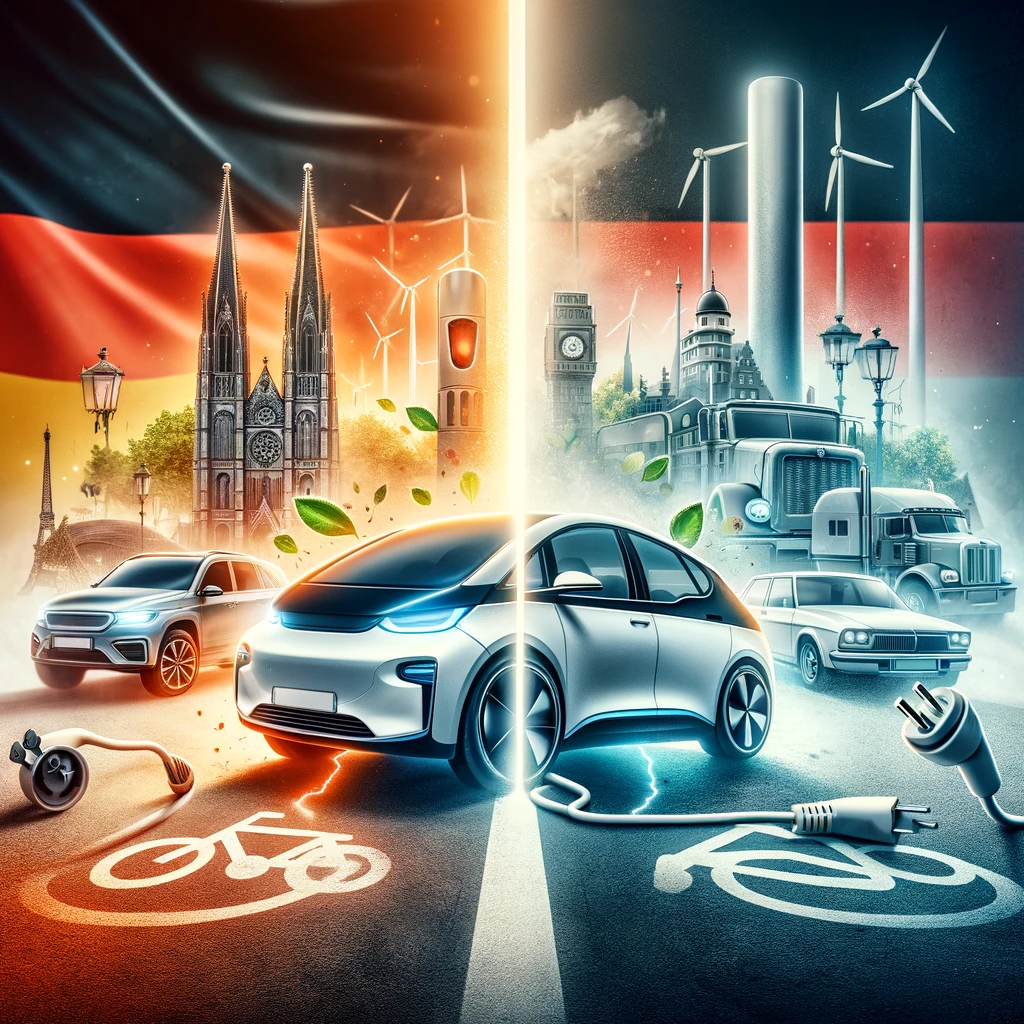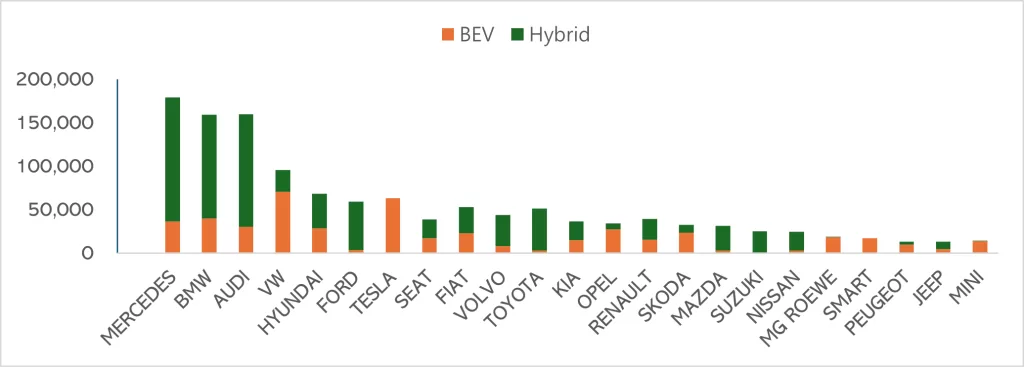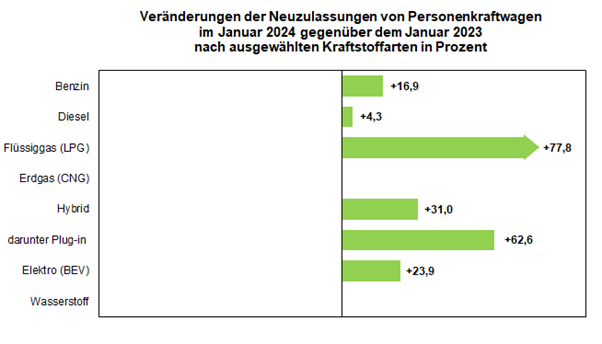
In December 2023, the German government ceased its subsidies for electric vehicles (EVs). Currently, German car manufacturers prefer a mixed production approach of internal combustion engines and electric vehicles, focusing on flexibility and efficiency, and are poised to respond to market fluctuations. Despite the end of government support for electric cars and ongoing economic uncertainty affecting consumer recovery, production of purely electric vehicles in Germany is expected to grow by +25%.
This article will proceed with the following sections:
- Background of the German Government’s Subsidy Cessation
- Impact on Electric Vehicle Sales
- Electric and Internal Combustion Engine Vehicle Sales by Brand
- Implications
1. Background of the German Government’s Subsidy Cessation
The decision by the German government was influenced by several factors. Firstly, the increase in the rate of electric vehicle adoption had placed a significant burden on the government budget. Secondly, the perception that electric vehicles could remain competitive without subsidies spread due to advances in EV technology and decreased production costs. Lastly, questions about the long-term sustainability of the subsidy policy were raised.
Clean Energy Wire detailed how the German government abruptly ended the electric car subsidy program following an austerity agreement to overcome a budget crisis, casting doubts on achieving Germany’s green mobility goals. The sudden cessation of the subsidy program faced extensive criticism, suggesting potential setbacks to the government’s plan to have at least 15 million electric cars on German roads by 2030.
The withdrawal of subsidies highlights the need for careful consideration in transitioning the role of government support, emphasizing that subsidy policies’ design and phased termination should not impede progress towards electric vehicle transition and climate goals.
2. Impact on Electric Vehicle Sales
The cessation of subsidy payments is expected to have a short-term negative impact on electric vehicle sales, as buyers may delay purchase decisions in response to reduced or discontinued subsidies. This could increase uncertainty among potential customers considering purchasing an electric vehicle.
Businessday NG reported a sharp decline in monthly sales volumes in the global electric vehicle market due to reductions in government subsidies and tax credits, particularly following subsidy reductions in European countries and mainland China. This trend indicates that tax benefits and subsidies still play a crucial role in consumers’ decisions to purchase electric vehicles.
However, in the medium to long term, the resilience of the electric vehicle market and technological advancements are expected to drive sales recovery. The reduced operational costs, environmental benefits, and improved range of electric vehicles will continue to be attractive options for many consumers. Moreover, car manufacturers will strive to offer more competitive prices and innovative technologies.
According to Reuters, despite the end of an 11-year subsidy program for electric vehicles in China in 2022, electric vehicle sales increased to record levels as some local governments continued to offer subsidies or tax rebates to attract investment and consumers. The global electric vehicle market grew by 34% during the same period.
3. Electric and Internal Combustion Engine Vehicle Sales by Brand in Germany
A look at the sales data of battery electric vehicles (BEVs) and hybrid vehicles in Germany clearly shows a shift in consumer preferences. Major car manufacturers like Mercedes, BMW, and Audi are demonstrating strong commitment to the electric vehicle transition, with notable success in BEV sales. Particularly, German consumers, known for their discerning automotive tastes, opting for BEVs over hybrids suggests growing confidence in electric infrastructure and vehicle functionality.

(Source: © Kraftfahrt-Bundesamt, Flensburg)
The German EV market continues to exhibit strong growth despite the absence of subsidies. This situation demonstrates the resilience of the electric vehicle industry, indicating that consumer interest and demand for electric vehicles can be sustained without subsidies. The attached image below shows the 2024 fuel type vehicle sales rates in Germany without subsidies.

(Change rate by fuel type of passenger cars from January 2023 to January 2024)
(Source: © Kraftfahrt-Bundesamt, Flensburg)
The fact that the German electric vehicle market’s growth continues despite the subsidy termination suggests that the electric vehicle industry has already achieved a degree of self-sufficiency and is likely to continue its positive growth. Electric vehicles are now seen as attractive options for consumers not only for their environmental sustainability but also for their economic practicality. The future of the electric vehicle industry will continue to evolve through technological innovation and market demand.
4. Implications
The global attention received due to the cessation of electric vehicle subsidies in Germany is not overstated. Firstly, it suggests that the electric vehicle market has reached a stage where it can exhibit resilience without initial government support. Maintaining growth despite the subsidy cessation shows that consumer trust and interest in electric vehicles are based on technological advancements and market maturity.
Secondly, this change presents a greater challenge to electric vehicle manufacturers. To maintain competitiveness in the market without relying on subsidies, continuous innovation in battery technology, range extension, and charging infrastructure expansion is required.
Thirdly, as part of global efforts towards environmental protection and sustainable mobility, electric vehicles continue to play a crucial role. This trend influences other countries and prompts the search for policies that will stimulate the growth of the electric vehicle industry worldwide.
Lastly, this will have significant impacts on environmental and transportation policies. Such changes in leading automotive markets like Germany reconfirm that the proliferation of electric vehicles is a crucial strategy to address global issues like global warming.
These implications require in-depth analysis and strategic planning for the global automotive market and environmental policies. The future of the electric vehicle industry remains bright, and the cessation of subsidies is unlikely to be a significant obstacle to the industry’s growth in the long term.



